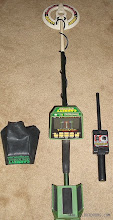Metal detectors of all types may be termed as device for hobbyists either in land (parks, beaches, shores, and even in ballpark bleachers), or deep-sea waters. Seldom would hunters of all kinds set to track on land, or to ferry on sea without this device.
These hobbyists or adventurers may find it very beneficial not in terms of using this device to really get expected hunt like the archeologists and the sea fearer underwater hunters and pirates, but it provides a lot of enjoyment and exercise attainable at any rate just like in athletic gymnasiums.
Viewing from the immediate past, the misconception of metal detector is that of a very bulky backpack that is shoulder breaking, conceptualized in relation to the heavy adventurous perk of one who goes out for great land or sea adventures. Today, the modern innovation of such device devaluated that bulky heavy concept for metal detectors are sleek, lightweight rig, easy to use and handy that won't make someone tire until he spots his pot of gold.
The Underwater Metal Detector
Considered a best companion for sea fearers, sea sports enthusiasts, and fishermen, this underwater device serves best beside a batch of other equipment to any hunter at sea. A deep ocean adventure is incomplete without this piece of metal device, and it is very valuable at all cost. To a skilled scuba diver, having it is a must before his plunge into the deep waters.
Manufacturers who have reached high levels of expertise in metal detector design, and perfected pulse discovery techniques over the years paved ways to cope with today's innovation of the underwater metal searcher. Both amateur and professional divers could avail alike for easy use, handling, reliability, and practicability.
One of the best, if not, the best in metal detector today; the Elsec Metal Detector 2000 manufactured of tough non-corrosive construction for heavy-duty, using PVC ultimate High-Pressure moldings.
High-level sensitivity competes with other metal detectors with usage of the pulse inductive detection techniques on either ferrous or non-ferrous, and iron of divalent nature, and extensive distances. With usability in approximate depth of 200 meters, it is neutrally buoyant, and controllable. To add it all in convenience, is the "no switch on and off" of power, for it automatically does so on both; upon immersion and up, from underwater.
A solid-state indicator alerts awareness how long will the battery last, but this model is furnished with rechargeable batteries that will automatically let power last for 10 hours. When metal is detected, you'll be directed to three ways attraction, (1) a graduated illuminated meter, (2) a solid flashing indicator, and a (3) variable frequency bone conductor earphone.
By using the best quality electronic components in the manufacture of underwater metal detector serves assurance in reliability and easy maintenance. If anything goes wrong unexpectedly, the circuit board could be out rightly replaced.
A metal detector is not much of a complex device. It has three basic parts. The first one is the coil which can come in different shapes, a power supply and a control box. Bulk of the job rests on the control box because it is that one part that is ticked when there is metal around and this ticking is what causes the metal detector to do its job.
Even the entire process of how the device works can be simplified in two sentences but then again there is a degree of difficulty concerned when we talk about a detector who is trying to detect a specific kind of metal.
Of all the different kinds of metal detectors, probably one of the most important is the gold metal detector. It is pretty obvious that gold is an element that is worth a lot in many ways and this makes gold metal detectors a prized possession as well.
How metal detectors identify various metals is by testing the conductivity of the metal. A target signal is eliminated for unwanted metals like leftover iron & steel, pull tabs, bottle tabs and others in the same group while increasing target signals to high conductive metals as gold along with brass and silver.
Apart from gold hunting, coin & relic hunting are also expensive areas of metal detecting. The other interesting thing is the underwater & wading detecting. The use of metal detectors in these areas gives the device a character that will not square it into a box as just a device for security measure.
The differences of these metal detectors lie in their technology, type of ground balance, frequency it operates in and of course the capability to discriminate between the many types of metals.
Going back to gold metal detectors, gold mining companies invest in high quality gold metal detectors because they really need to find the best one in order to stay, survive or earn in the business.
If you are able to find the best gold metal detector that means it will be easier for the workers to find this precious metal meaning more money for everyone if you will not be successful then it means you invested in an equipment that is not so helpful. In the latter's case, you might need to discard your existing equipment and buy a better one or upgrade your existing one.
About the Author:
Low Jeremy maintains http://Barbie.ArticlesForReprint.com. This content is provided by Low Jeremy. It may be used only in its entirety with all links included. Read More....
Garret Metal Detector
Wednesday, January 7, 2009
Subscribe to:
Post Comments (Atom)


No comments:
Post a Comment